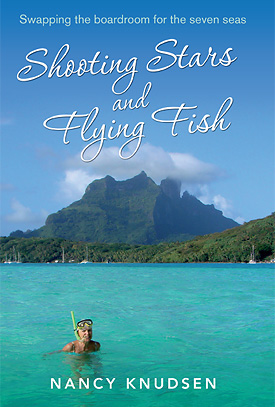
Nancy Knudsen
Allen & Unwin, 2011
|
|
|
Nancy Knudsen, Shooting Stars and Flying Fish, extracts
‘As we make our way northwards, anchorage by anchorage, Ted cannot seem to wipe the smile off his face. It is a slower process for me. I still wake every morning with guilt as well as euphoria. I did it! We’re here! one part of me shouts joyfully. But there’s also a refrain that repeats in my head: Shouldn’t I be at work? Am I really allowed to be here? Occasionally I find myself singing as I rush around my small daily tasks. Singing? I never sing.
My manicured nails are gone, the stockings, the suits, the deadlines. I wear only shorts and T-shirts, thongs or sailing shoes. There are other adjustments, and one of the biggest comes from the knowledge that we have to learn to conserve water. I have what I consider "normal" habits– rinsing dishes freely before putting them in the dishwasher, leaving the tap running while I brush my teeth…and then there are the showers. I remember that my childhood was peppered with demands from my mother and other loved ones that I get out of the shower, this second!
"You’ve been in there a full forty minutes."
"It’ll cost us a fortune in excess water rates."
"You’ll use up all the hot water. Other people want to have a shower too, you know."
As an adult I have always treasured the luxury of the long, long hot shower with no one to yell at me to get out. But our small onboard water-maker, which converts salt water into fresh, makes only thirteen litres an hour and uses power, a precious commodity which is generated by the sun, wind or the fuel of the engine. In anticipation of long periods in remote areas, I take up the challenge of showering using as little water as possible. Here’s how to have a frugal shower:
Lean over the wash basin, which you have stopped with a plug, and aim the handheld shower at your head so that most of the water wets it, and the rest falls into the basin. Quickly turn the tap off. Now stand up straight and wriggle a little so that any spare water drips down over your body. Interim result is a wet head, damp body and basin containing warm water.
Next, shampoo your hair into a rich lather. Also use this lather to wash your under-arms, your crotch and as much as possible of the rest of your body. This saves using soap. Turn the tap back on and quickly wash the lather out of your hair while bent over the basin. This may cause a little spine-warping, but it’s all in a good cause. Bend further over the basin to rinse the body, ending up with even more soapy water in it– and a slightly more curved spine.
Now for the pièce de résistance. Take your dirty knickers, shirt and shorts and wash them in the soapy water in the basin left over from your "shower".’
(From Sailing in Circles and Sinking by the Bow)
‘Almost every morning Ted puts out a trawling line using little fake fish as bait. In my opinion, loudly expressed, they wouldn’t fool the stupidest fish, with all those hooks down their sides.
"So when are we getting fish for breakfast, Ted?" I ask mischievously one morning.
He grins back. "As a fisherman, I guess I make a very good sailor."
As if on cue, the line is pulled out of the peg, which signals the bait has been taken. We both jump in shock, and after a struggle Ted hauls in a very large bright blue-green fish. He then manages to get it out of the water so that it hangs down over the side of the boat, slapping and banging. It is big. Very big– maybe a metre from nose to tail. I feel my toes doing a little dance on the deck in excitement.
"Get the gaff!" Ted shouts at me.
"The what?"
"The gaff! The gaff! Don’t just stand there."
"What’s a gaff?"
"You know– the gaff. The gaff, for crying out loud. On the foredeck with the oars."
As I rush to the foredeck I can hear the fish still slapping against the boat as Ted prances from one foot to the other, trying to tame it. Blackwattle, luckily, is sailing herself.'
(From Sailing in Circles and Sinking by the Bow)
‘Getting a boat ready for a long sea voyage is a nail-biting affair, and the Pacific is the biggest ocean of all, with mostly only unsophisticated islands as stopovers. The navigation computer is four years old. What if it fails? (We quickly buy another.) Do we have enough spares for electronics, mechanics, snatch blocks, cabin globes and lures for all the fish we are to catch? Will the Vegemite last? Lollies for the island children? Check the red wine. My sailing gloves have a hole. How’s the medical chest– short of anything? It goes on and on interminably, and that’s before you get to the provisioning.
It’s a floppy listless sea as we motor away from Panama City. The air is thick and sweaty and the sky is a forlorn mess of grey stains and dirty whites, like some of Ted’s favourite cruising shirts.
But within a few minutes the alien world of bland water and sky turns electric with life. Marlin jump straight and high from the water and fall with dramatic belly-flops. Dolphins galore soar in graceful arcs then swoop below the boat, dozens of slippery bodies– here, there, look quickly! Who cares what the future may hold when the present is so blissful?'
(From The Home Ocean)
|

